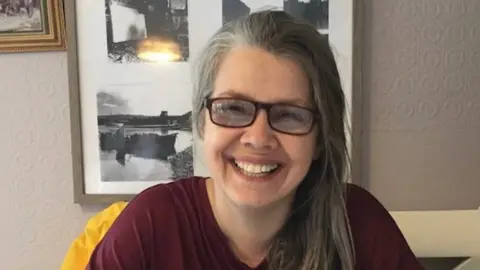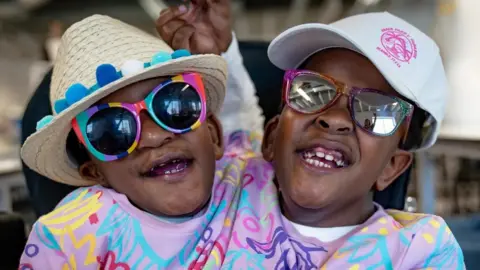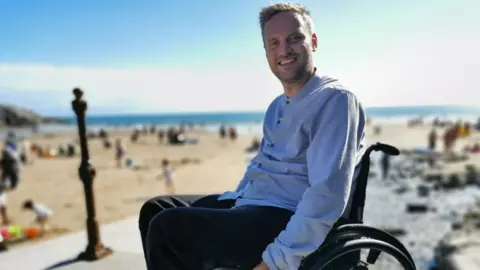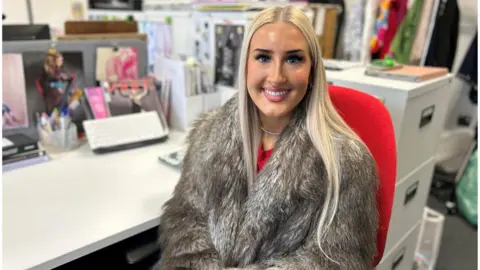Designers make bespoke fashion for conjoined twins
A dad who struggles to dress his conjoined twin daughters has welcomed calls to make mainstream fashion more accessible.
Seven-year-olds Marieme and Ndeye share many things, but not the same sense of style.
So staff and students at the University of South Wales' fashion department are creating bespoke designs just for them.
Now the team of designers are helping them express their individuality and feel more comfortable in their clothes.
"When I first heard about the girls I thought what an amazing project to be involved in," said Susan James, a technical instructor in fashion at the university, which offers modules in adaptive fashion.
"To give them something they can't normally get - to be able to go into a store and that excitement and everything that brings with it."

The girls are joined at the pelvis, sharing one pair of legs. Ndeye has a left arm and Marieme a right, and they share use of a middle arm. Their father Ibrahima struggles to dress them.
"It is giving me grey hairs every day," he joked. "You have to buy two identical tops to join them together.
"They have two legs, so they can have regular trousers, but their hips are very wide so you have to take it to the alteration shop."

Although the girls are conjoined, they have different taste in clothes.
Ndeye likes pink. Marieme likes red. Ndeye would like a unicorn motif. Marieme is obsessed with cats.
The girls are thriving, but still face many challenges and are dependent on each other to live. Ndeye's system works hard to help support Marieme, which makes her hotter and sweat more than her sister.
Now the fashion department has joined a t-shirt for Ndeye with a sweatshirt for Marieme, and adapted a winter coat with less thermal padding for Ndeye and more for Marieme.
The girls' bodies and needs are unique. But there are calls for more wearable fashion for all disabled people.
'It gave me dignity'

BBC reporter Matthew Bassett, who was paralysed 12 years ago after he dived into the sea at Broadhaven in Pembrokeshire and hit his head, shared some of the lesser known challenges of being in a wheelchair.
"When I was first in a wheelchair I was buying jeans off the shelf making the most of it," he said.
"But they didn't quite fit, they were quite low on the back, and if they weren't low on the back they were high on the legs, so I was always showing my ankles.
"I ended up having to ask friends or family to always pull up these jeans. It's not what you want to ask everyone to do is it? A grown man asking someone to pull up your trousers every couple of hours.
"But I had to do it because if they go to low they give you pressure sores, they give you marks.
'When I got a pair of jeans that covered up my back it just felt so great, it gave me dignity, independence."
But Matthew has to buy these online, and they cost £80 a pair.
"I would love to see bigger chains jumping on board and that will bring the price down of styles, and everyone will win then," he said.
'They weren't comfortable or practical'

Philippa Gouldson, 20, is a second year fashion design student at the University of South Wales.
After a running accident when she was 14, she spent five months in a wheelchair, and still has physiotherapy now. Her experience is now helping to inform her designs.
"Becoming a wheelchair user, all my lovely clothes in my wardrobe I wanted to wear, they just weren't comfortable or practical," she said.
"I really struggled getting them on. My mum had to help me.
"That's one thing I've really focused on, making someone feel good in their clothes, but giving some dignity back as well, I think that's such an important thing."
High street chains are beginning to take notice. Last month, Primark became the latest to announce plans to offer more affordable accessible underwear range in its shops.
But adaptive clothing is still generally harder to find and more expensive than items on the high street.
"Something like this does tend to be more expensive. But the more we do of it, the more we can bring the price down," said Susan back at the University of South Wales.
"It would be great if a label or a brand would take it on, make it more mainstream."

- QUEERLY BELOVED: Sam and Shauna explore same-sex marriage in Wales
- THE LEARNERS IS BACK: It's a new term for Jonesy's merry band of students

